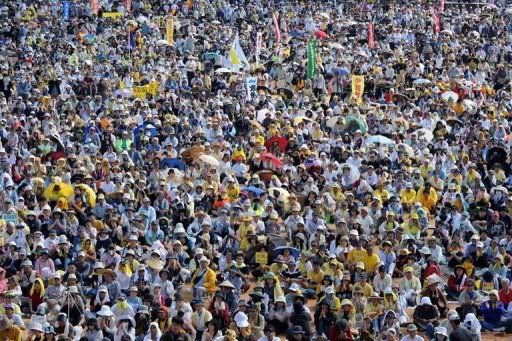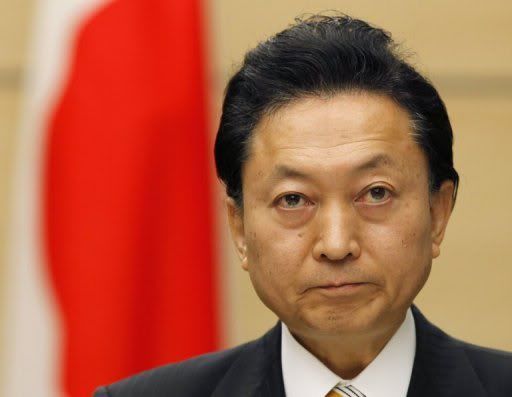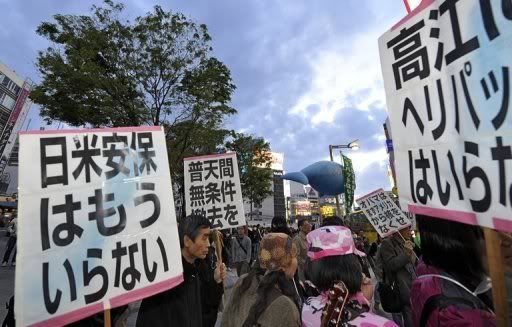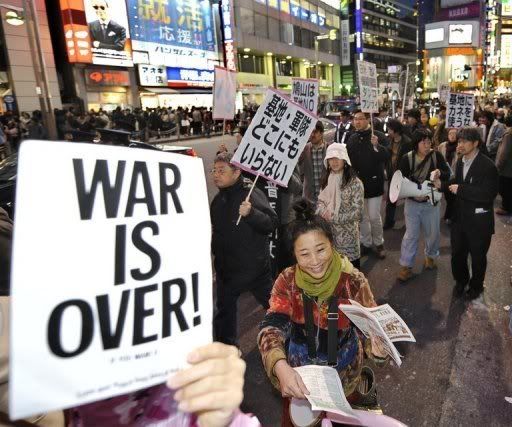
Japanese protesters gather in a rally against the US airbase at Yomitan

The Okinawa dispute threatens the political future of centre-left Prime Minister Yukio Hatoyama

Protesters stage a rally with placards reading 'No need for the US-Japan Security Treaty'

Protesters stage a rally with placards demanding 'No base, No military' in Tokyo
Japanese Prime Minister Yukio Hatoyama on Monday reiterated his pledge to relieve the U.S. marine base-related burden on people in Okinawa Prefecture and rid them of safety risks posed by the base.
Nearly 100,000 protesters attended a rally on Okinawa Sunday to demonstrate against a US air base in a row that is dominating Japan's national politics and souring its ties with Washington.
Okinawa governor Hirokazu Nakaima, the speaker of the Okinawa assembly and most of the mayors of the Okinawa prefecture's 41 towns joined the huge protest near Kadena Air Base, the Asia-Pacific region's largest US military facility.
Under a blazing sun at an athletics ground on the subtropical island, protesters applauded and whistled as speakers addressed them from a podium.
Demonstrators held yellow banners with messages protesting against the US military presence, including: "No Base!" and "US bases leave Okinawa!"
The row centres on US Marine Corps Air Station Futenma, which under a 2006 pact with Washington was to be moved from the crowded city of Ginowan to the quieter coastal Henoko area of Okinawa.
Prime Minister Yukio Hatoyama, whose party won September's general election by a landslide, has said he will review the 2006 deal and move Futenma off Okinawa island. But a search for alternative locations has provoked more local protests.
"We want Prime Minister Hatoyama to keep to his pledge, especially on the (relocation) of the Futenma air base," Nakaima said to loud applause at Sunday's rally.
"Okinawa has suffered the overwhelmingly heavy burden of US bases since the end of the war" in 1945, he said. "Today, there are few traces of the war in Okinawa. But US bases still remain in front of us. This is so unfair."
Many of the islanders resent the heavy US military presence on Okinawa, a legacy of Japan's defeat in World War II, and complain of noise, pollution and friction with US soldiers.
The issue of relocating US bases threatens Hatoyama's political future, with the prime minister caught between Washington and his left-leaning political allies in the dispute.
"Prime Minister Hatoyama has raised strong hopes among Okinawans," said Zenshin Takamine, the Okinawa assembly's speaker, demanding that Hatoyama to keep his promise.
"Okinawans cannot bear the burden of US bases anymore," he said. "With the governor's participation in this rally, Okinawa's voice is united. We say 'no' to Futenma base!"
Hatoyama has set himself a deadline of late May to resolve the issue but, since he came to power in September, the United States has not dropped its insistence that Tokyo to stick to the original relocation plan.
On Friday, under questioning from a conservative lawmaker, Hatoyama staked his job on finding a solution by the time his deadline expires.
The premier's right hand man, Chief Cabinet Secretary Hirofumi Hirano, told Japan Broadcasting Corporation (NHK) that he "sincerely" accepted opinions of Okinawa residents.
"We sincerely accept (opinions at) the gathering," Hirano told the national network. "By hearing voices of the island residents, we will work hard to draft a good plan of the government."
Ahead of crucial upper house elections due in July, Hatoyama has seen his approval ratings dive as criticism of his dithering on the issue has grown.
The United States established the Futenma base in 1945 after it occupied Okinawa following some of World War II's bloodiest battles.
It did not return Okinawa to Japan until 1972 and still operates more than 30 military facilities on the island, strategically located near China, Taiwan and the Korean peninsula.
Under the 2006 agreement, Futenma facilities will be moved to reclaimed land around Camp Schwab in Henoko and about 8,000 Marines will move to the US territory of Guam.
More than 70 percent of US military facilities in Japan -- along with more than half of the 47,000 US troops stationed there -- are located in Okinawa.
The premier's move came after up to 90,000 Okinawa residents staged a mass rally Sunday in the village of Yomitan on the western coast of the Okinawa Island, demanding the central government relocate the base outside of the southernmost prefecture.
In front of his official residence, Hatoyama told reporters that the rally was an expression of public will.
He pledged continued efforts to ease the burden that falls on Okinawa residents and remove the risks of the Futenma base.
Under an existing agreement with Washington inked in 2006, the U. S. military installation would be moved from the highly populated area of Ginowan in Okinawa to the Marines' Camp Schwab in Nago, also in Okinawa. The DPJ-led government has looked to review that agreement, much to the ire of the U.S. government.
On Thursday, the United States rejected the idea proposed by the Japanese government of relocating its current air facility in Futenma, Okinawa Prefecture, to Tokunoshima of Kagoshima Prefecture.
Local populations in Okinawa and Tokunoshima have also been angered by the Democratic Party of Japan (DPJ), seeing their actions as both indecisive and not in the interests of their communities. On April 18, a massive protest on the Tokunoshima island was staged, which saw some 15,000 residents mobilize to show their defiance to the plan.





0 comments:
Post a Comment